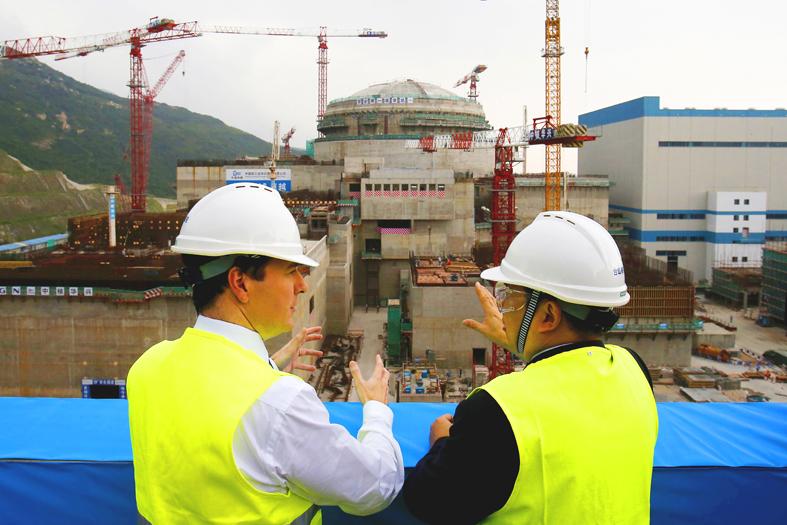The British government is exploring ways to remove China’s state-owned nuclear energy company, China General Nuclear Corp (CGN, 中國廣核集團), from all future power projects in the UK, in a further sign that relations between the countries are deteriorating.
Projects potentially at risk include the £20 billion (US$27.5 billion) Sizewell C nuclear power station in Suffolk and the proposed Bradwell-on-Sea development in neighboring Essex, a person familiar with the matter said on condition of anonymity.
CGN is also a 33 percent investor in the Hinkley Point C facility, which is under construction in Somerset and one of the biggest infrastructure projects in the country.

Photo: AP
The move underlines how British Prime Minister Boris Johnson’s administration is hardening its stance toward Beijing.
Johnson has blocked Huawei Technologies Co (華為) from participation in the rollout of Britain’s 5G wireless network and earlier this month, the British National Security Adviser opened a probe into the takeover of the country’s biggest chip plant by Chinese-owned Nexperia NV.
“All nuclear projects in the UK are conducted under robust and independent regulation to meet the UK’s rigorous legal, regulatory and national security requirements, ensuring our interests are protected,” a British Department for Business, Energy and Industrial Strategy spokesperson said in a statement, when asked about the stance. “Nuclear power has an important role to play in the UK’s low-carbon energy future, as we work towards our world-leading target to eliminate our contribution to climate change by 2050.”
News of the CGN plans was first reported by the Financial Times newspaper late on Sunday.
Chinese Ministry of Foreign Affairs spokesman Zhao Lijian (趙立堅) yesterday said: “The British should earnestly provide an open, fair and nondiscriminatory business environment for Chinese companies.”
China and Britain are important trade and investment partners for each other, he added.
“It is in the interests of both sides to conduct practical cooperation in the spirit of mutual benefit and a win-win result,” Zhao said.
Members of Johnson’s Conservative Party have repeatedly expressed concern about China’s increasing involvement in critical aspects of UK infrastructure and in its major educational establishments, such as Cambridge University.
Former party leader Iain Duncan Smith has said that Britain should use its post-Brexit status to put human rights at the heart of trade deals.
Nuclear power is set to play a key role in the government’s commitment to slash greenhouse gas emissions to net zero by 2050.
Although a major investment in offshore wind farms is set to help meet that goal, the country’s transmission network is to rely on nuclear as a backup — nuclear stations are designed to generate energy around the clock, whereas wind power is less predictable.
Additional reporting by Reuters

Taiwanese suppliers to Taiwan Semiconductor Manufacturing Co. (TSMC, 台積電) are expected to follow the contract chipmaker’s step to invest in the US, but their relocation may be seven to eight years away, Minister of Economic Affairs J.W. Kuo (郭智輝) said yesterday. When asked by opposition Chinese Nationalist Party (KMT) Legislator Niu Hsu-ting (牛煦庭) in the legislature about growing concerns that TSMC’s huge investments in the US will prompt its suppliers to follow suit, Kuo said based on the chipmaker’s current limited production volume, it is unlikely to lead its supply chain to go there for now. “Unless TSMC completes its planned six

Intel Corp has named Tasha Chuang (莊蓓瑜) to lead Intel Taiwan in a bid to reinforce relations between the company and its Taiwanese partners. The appointment of Chuang as general manager for Intel Taiwan takes effect on Thursday, the firm said in a statement yesterday. Chuang is to lead her team in Taiwan to pursue product development and sales growth in an effort to reinforce the company’s ties with its partners and clients, Intel said. Chuang was previously in charge of managing Intel’s ties with leading Taiwanese PC brand Asustek Computer Inc (華碩), which included helping Asustek strengthen its global businesses, the company

Power supply and electronic components maker Delta Electronics Inc (台達電) yesterday said second-quarter revenue is expected to surpass the first quarter, which rose 30 percent year-on-year to NT$118.92 billion (US$3.71 billion). Revenue this quarter is likely to grow, as US clients have front-loaded orders ahead of US President Donald Trump’s planned tariffs on Taiwanese goods, Delta chairman Ping Cheng (鄭平) said at an earnings conference in Taipei, referring to the 90-day pause in tariff implementation Trump announced on April 9. While situations in the third and fourth quarters remain unclear, “We will not halt our long-term deployments and do not plan to

The New Taiwan dollar and Taiwanese stocks surged on signs that trade tensions between the world’s top two economies might start easing and as US tech earnings boosted the outlook of the nation’s semiconductor exports. The NT dollar strengthened as much as 3.8 percent versus the US dollar to 30.815, the biggest intraday gain since January 2011, closing at NT$31.064. The benchmark TAIEX jumped 2.73 percent to outperform the region’s equity gauges. Outlook for global trade improved after China said it is assessing possible trade talks with the US, providing a boost for the nation’s currency and shares. As the NT dollar